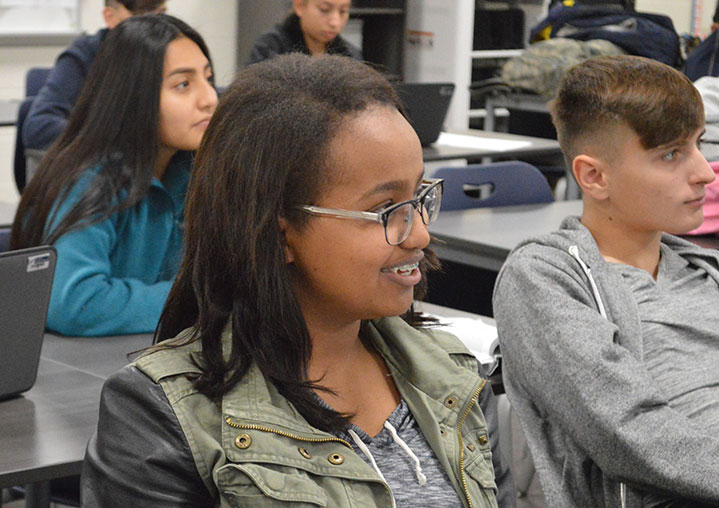As a teacher at one of the most diverse high schools in Michigan, Katie Baechler knows many of her students and their families are affected by injustice and discrimination. She thinks that’s a reason to get them talking about their constitutional rights and issues they face in today’s heated racial and political climate.
Her students have plenty to say. Topics that come to light in Baechler’s new AP Civics class include current hot-button issues in comparison to historical events involving racism, social justice and Civil Rights. Her students, along with sociology teacher Amy Raczynski’ class, recently saw the movie “Marshall” at Celebration! Cinema to provide context for discussion.
The movie is the story of Thurgood Marshall, who in 1967 was the first African American appointed to the Supreme Court. Prior to that, as a lawyer in 1954, Marshall succeeded in having the Supreme Court declare segregated public schools unconstitutional, in Brown v. Board of Education.

The movie focuses on one of Marshall’s lesser-known cases as a lawyer for the NAACP. Marshall traveled to conservative Connecticut when wealthy socialite Eleanor Strubing accused black chauffeur Joseph Spell of sexual assault and attempted murder. Marshall teamed up with Sam Friedman, a local Jewish lawyer who had never handled a criminal case. Together, the two men built a defense while contending with racist and anti-Semitic views from those who deemed Spell to be guilty.
“In the movie, automatically the black man was (assumed) wrong, regardless of what the story or the actual evidence was,” said senior Matt Postma.
“People in the town tried to scare Thurgood Marshall away from the case,” added seniorKenneth Courturier.
“They tried to make (Spell) take a plea bargain and made it sound as good as possible, but really it wasn’t good because he wasn’t guilty,” said senior Kymere Griffin.
Comparing Past to Present
In the classroom, Baechler challenged students to think about the movie in light of current race relations. Issues brought up included the NFL protests and the backlash against Colin Kaepernick, former San Francisco 49ers quarterback who began taking a knee last year during the National Anthem to protest oppression against black people and other people of color. They also discussed discrimination against Hispanics, targeted as “illegals”; and constitutional rights of all people and the press.
Students agreed the Black Lives Matter movement has parallels to issues of the past. They said Kaepernick and U.S. Senator Bernie Sanders, from Vermont, are social justice champions today.

“History always repeats itself, and that’s a huge message we teach here,” Baechler said. “You have to be aware of history in order to correct it. We’ve had so many terrible things in our history, and we want to be able to learn from it and move forward. Working in a super diverse school, discrimination affects so many of our students on so many levels. With everything on the news right now, there is so much going on we can relate this class to.”
Students said knowing their rights can help protect them from being manipulated. About NFL protests, “If it’s your constitutional right and you have that platform, why not speak out?” asked senior Kaleb Spratling.
Added Kenneth: “(The movie) gives us a backstory about how different but similar our society is today regarding our constitutional rights. Even though they are the same as it has been for the country for a long time, it’s different how it’s interpreted today compared to then.”
In the context of Marshall’s work in passing Brown v. Board of Education, Baechler pointed out the state of public education today.
“We really talk about that, she said. “Even though there have been a lot of laws to counteract that, there’s still discrimination and segregation is still very rampant, especially in Grand Rapids.”
CONNECT
Public Schools More Segregated Now than 40 years Ago










